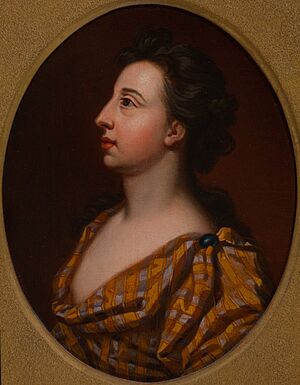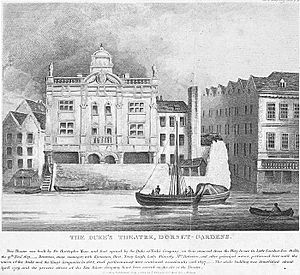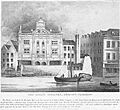Elizabeth Barry facts for kids
Elizabeth Barry (born 1658 – died 7 November 1713) was a very famous English actress during the Restoration period. This was a time when theatre became popular again in England.
Elizabeth Barry was known for being a great tragic actress. She worked for important theatre companies in London. From 1675, she was with the Duke's Company. Later, from 1682 to 1695, she joined the United Company, which was the only theatre group in London for a while. After that, she became a founding member of Betterton's Company in 1695. Her acting career started about 15 years after women were first allowed to act professionally on the London stage. Before this, boys used to play female roles in plays by writers like Shakespeare.
A famous actor named Thomas Betterton said that her acting could make even boring plays exciting. Another critic, John Dennis, described her as an amazing actress who could change her feelings on stage just like nature, moving from one strong emotion to another with great power and grace.
Contents
Early Acting Career
Elizabeth Barry's first play was Alcibiades by Thomas Otway when she was 17. Her performance was not very good, and she was even fired from the Duke's Company. But then she met John Wilmot, 2nd Earl of Rochester. He helped her improve her acting. They had a child together named Elizabeth, who was born in 1677 and passed away in 1689.
Barry was also good at Restoration comedy, playing many funny heroines. But her biggest impact was as a tragic actress. She was amazing at showing sadness and deep feelings. Playwrights like Thomas Otway and Thomas Southerne wrote special sad roles just for her. These included Monimia in Otway's The Orphan (1680), Belvidera in Otway's Venice Preserved (1682), and Isabella in Southerne's The Fatal Marriage (1694).
A theatre worker named John Downes wrote that these roles made her famous. He said that whenever she acted in these parts, she made the audience cry, especially those who felt pity for people in trouble.
Years later, the actor Colley Cibber remembered how powerful her voice was. He said that when she showed sadness or tenderness, her voice became very soft and beautiful. He believed she was better than any other actress at making people feel pity. Some historians believe that her success in the role of Monimia helped make "she-tragedy" a popular type of play. These were plays where women were the main characters facing sad and difficult situations.
People often said Elizabeth Barry was not very pretty in real life. Her portraits show she was smart but had strong features. However, this did not matter when she was on stage. An anonymous writer in 1702 said that even though Barry was "the ugliest Woman" off stage, she was "the finest Woman in the World upon the Stage." It was known that her own life experiences helped her bring her characters to life.
Later Acting Career
As Elizabeth Barry's career continued, she started playing more roles as a mother figure. She worked for the Duke's Company from 1675 to 1682. One famous role was Cordelia in Nahum Tate's 1681 version of Shakespeare's King Lear, where she acted alongside Thomas Betterton.
In 1682, the Duke's and King's theatre companies joined together to form the United Company. Elizabeth Barry remained one of the top performers in this new company. For 12 years, it was the only theatre company in London.
In 1695, a year after her performance in The Fatal Marriage, Barry decided to leave the United Company. This was because of a disagreement about her pay. She then joined a new company with actor Thomas Betterton and actress Anne Bracegirdle. Elizabeth Barry was one of the original owners of this new actors' company. They opened at Lincoln's Inn Fields with a huge hit play called Love For Love by William Congreve in 1695. This new company successfully challenged the old United Company. However, there was a big difference in pay between men and women actors. For example, Betterton was paid £4 and 20 shillings per week, while Barry only received £2 and 10 shillings.
Elizabeth Barry officially retired from acting in 1710 when she was 52 years old. Her acting career lasted for 35 years. She passed away three years later, at the age of 55, due to a fever.
Fictional Stories About Her
Elizabeth Barry appears as a character in some fictional works. She is a supporting character in The Libertine, a play by Stephen Jeffreys about the life of John Wilmot. She also appears in the 2004 movie version of the play, where she is played by Samantha Morton. Barry is also a character in the 2015 play [exit Mrs Behn] or, The Leo Play by Christopher vanDer Ark.
Images for kids
See also
 In Spanish: Elizabeth Barry para niños
In Spanish: Elizabeth Barry para niños





